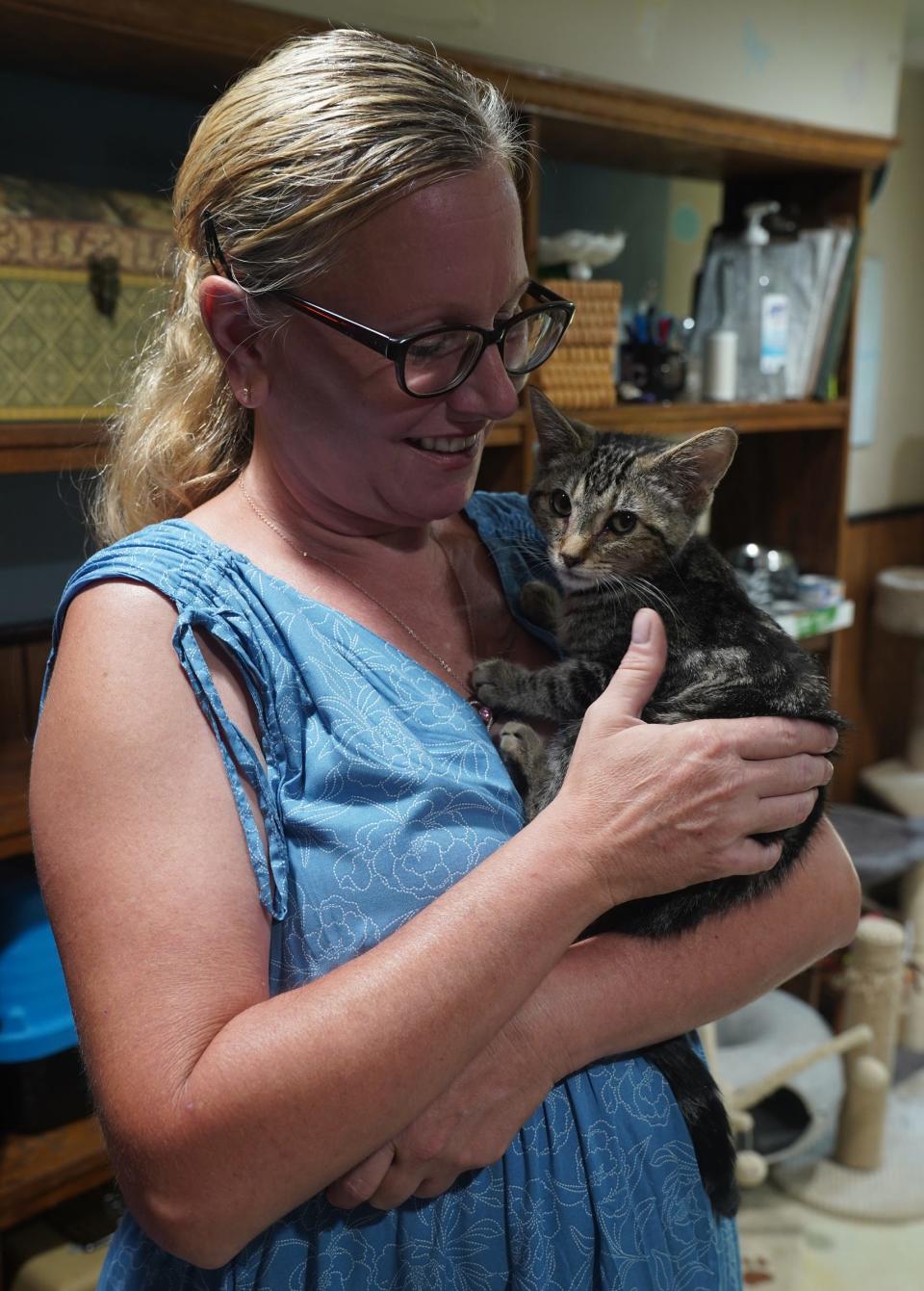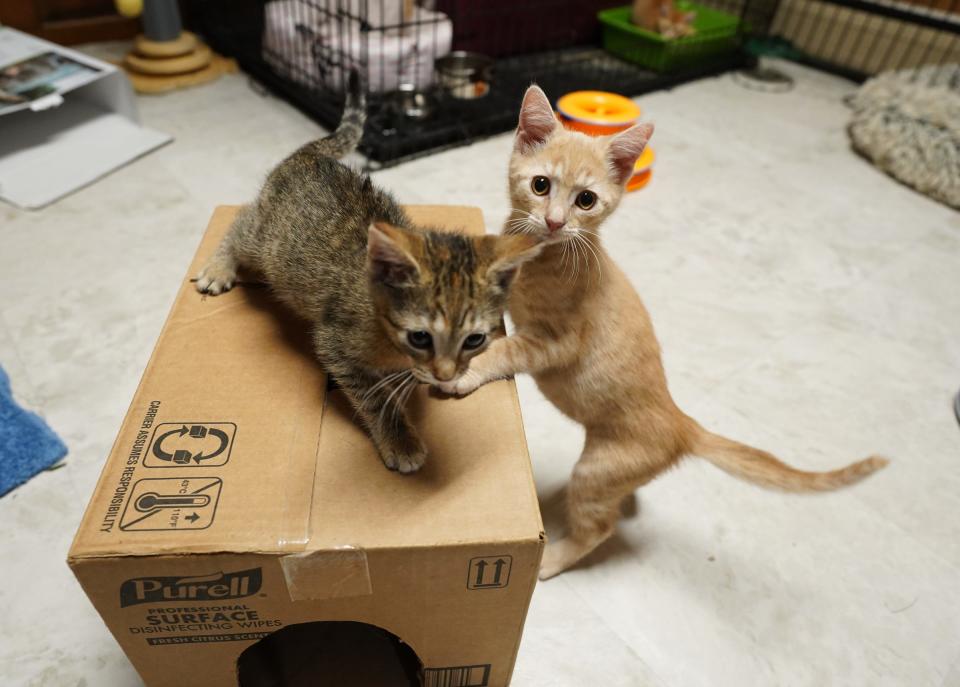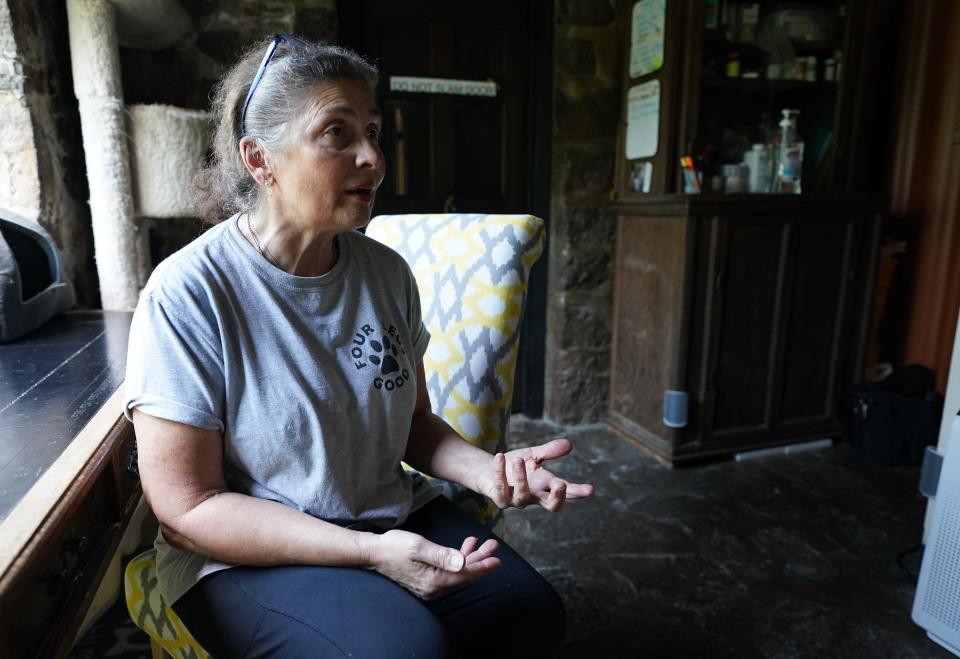Rockland Green program aims to reduce feral cat populations, working with advocates
Thousands of feral cats live in the woods, industrial parks, and housing complexes across Rockland, while depending on the dedication of animal lovers to survive.
The ferals reproduce at a rapid pace, increase their numbers and test the hearts and consciences of those concerned about their well-being.
The problem has reached a saturation point where Rockland Green, which runs animal care and waste disposal programs, is looking to curb the population through the humane method of trap, neuter, vaccinate, and release.
For advocates, Rockland Green's countywide focus on feral cats, scheduled to start Aug. 24, is long overdue. Many advocates have been trapping and neutering ferals for years, but the cats far outnumber the trappers.
“Rockland County is a progressive enlightened community that, however, has a dismal record when it comes to animal welfare," Nixie Gueits said. "They're finally stepping into the light and addressing the problems and needs of feral cats. We've been waiting decades for this program."
Rockland Green neutering program for ferals
Gueits leads Four Legs Good, a non-profit volunteer organization partnering with Rockland Green and other advocates.
Her group has long practiced trap, neuter, vaccinate, and return in an effort to control the feral cat population. Her South Mountain Road sanctuary houses 30 cats and kittens with another estimated 40 in foster care. Students come to the retreat to socialize with the kittens, as well as clean the premises.
Rockland Green has been viewed with hesitancy by many animal welfare advocates since its origins were overseeing Rockland's waste management - including multiple forms of recycling, composting, and trash collection and disposal. The five town supervisors and waste management authority board changed the name and assigned Rockland Green the role of overseeing animal welfare programs and the Hi-Tor Animal Care Center, founded in 1973.
Rockland Green is developing an animal shelter at a Beach Road warehouse in Haverstraw to replace the dilapidated Hi-Tor shelter off Route 45 in Ramapo, near the Rockland Fire Training Center and the Ramapo baseball stadium. Issues with costs and location have made the Haverstraw choice controversial after the county government dropped out of developing a new shelter.
Rockland Green Executive Director Gerard Damiani Jr. said Gueits had questioned the agency's commitment to animal welfare at public meetings and they got to talking. They reached a consensus and the feral countywide feral program came into being.
Damiani is confident the feral cat program will work and the new shelter will improve life for stray dogs, cats, and other animals. He said that during the design phase of the animal shelter, Rockland Green recognized the importance of humanely reducing the county’s exploding feral cat population. He said the projected time frame to control the population is five to seven years.
"Why wait," he said. "We need to start now to get this under control. If we don’t get our hands around the exploding feral cat population, we will always have a population ultimately sent to the shelter. We are going to make the program successful."
He said they met with Orange County-based The Animal Rights Alliance. TARA will provide the neutering services and has brought its spay and neuter clinic sporadically to the Palisades Center in West Nyack. TARA did the medical procedure on dozens of cats on Thursday morning.
Working with TARA and Four Legs Good, Rockland Green will be sponsoring four events to neuter cats: Aug. 24, Oct. 5, Nov. 2, and Dec. 7. With $27,000 of Rockland Green money, each event will offer 80 appointments for residents, local feline rescue groups and trappers to have cats neutered. The cost per cat will be $70 from Rockland Green and each trapper pays $10 per cat.
Rockland Green also will provide space for the cats to stay prior to surgery and then recoup afterward. The cats would then be returned to their colony as the program calls for mapping the locations.
Each feral cat trapped in conformity with the program will receive the following before being released into the wild:- Mandatory small tattoo on the underside of the feral to show it has been sterilized.- Rabies vaccination and ear tip.- Nail trim.- Ear cleaning.- Mapping of feral colonies.
Damiani said he's aware of the history of feral cats and the protracted attempts to build a modern animal shelter. He said the debates should give way to a fresh start and partnership with Four Legs Good and other animal advocates.
"I don't look at what happened in the past," Damiani said. "I need to move forward. We realized quickly that we can't build a facility big enough to handle all the stray cats, alone. Our consultant told us unless we get control of the situation, we'd always have capacity issues."
A cat-lover's work with a feral cat colony

Outdoor cats, often called feral cats or community cats, are domestic cats who live outdoors and without a clear owner. The stray feline population has been estimated at 50,000 living in hundreds of small colonies in abandoned buildings, backyards, and wooded areas from the Palisades to Bear Mountain.
Humane Society: Answers to questions about outdoor cats
Lisa Donadio oversees two such colonies of dozens of cats - one at her home in Pomona and another in Nanuet, where she said people dump cats and that can create conflicts with other colony felines. She feeds them and provides companionship and medical needs when necessary. She also has taken many into her home.
While tending to the cats is a labor of love for Donadio, it's expensive and heartbreaking when she loses a cat to death. She said she's been doing cat rescues for 25 years, paying the costs "mostly out of my own pocket."
"I’ve gotten more cats than I can count fixed over the years to try to reduce the population but it’s overwhelming and incredibly sad because a lot of the cats wind up getting run over or killed in other ways living outside," she said.

Hi-Tor takeover: Rockland Green takeover of Hi-Tor animal shelter completed. Here are the details.
Donadio said she doesn't know all the nuances of the Rockland Green program but has faith in Gueits and Four Legs Good. She said they do an amazing job.
She agreed with Gueits' prognostication that the program could become a game-changer in how the county deals with feral cats.
"I had been wary of Rockland Green in general just because I thought they knew nothing about animal rescue," she said. "Four Legs Good does the brunt of rescue in this county and Nixie is very much in the know as she was the one negotiating with them to do it. I am pleased now at the direction this is going."
Rockland animal shelter is not involved
The Hi-Tor Animal Care Center is not involved with the Rockland Green program, though the agency oversees the shelter. The 50-year-old shelter, run by mostly volunteers and a small paid staff, has undergone changes in personnel and volunteers over the years. The shelter. long supported by contributions and volunteers, has a long controversial history centering on management, costs, and questions about animal safety.
Problems at Hi-Tor convinced Orangetown to contract with the Hudson Valley Humane Society in Pomona to house its stray dogs, but not cats.

The Humane Society is being considered with Hi-Tor to run the new shelter in Haverstraw when it opens as scheduled in 2024, though the supervisors on the Rockland Green board seem to have lost confidence in the Hi-Tor administration. Gueits said Four Legs Good will make a bid to run the new shelter.
The Beach Road shelter could cost upwards of $18-plus million to retrofit, a price similar to what scared off the county legislators and the supervisors. The Rockland Green Board had promised a much lower cost.
Hi-Tor Executive Director Rick Tannenbaum, an attorney who helped negotiate Hi-Tor's lease relationship with Rockland Green, said he doesn't know why the animal shelter isn't included and has long advocated the trap, neuter, vaccinate and release concept.
"I don't decide who participates," he said. "We would welcome the opportunity to participate but haven’t been asked."
Damiani said Hi-Tor is contracted to provide spay and neutering for home-bound cats, not the ferals.
Gueits, once a Hi-Tor board member for more than a decade, said philosophical differences exist and she doesn't believe Hi-Tor has the personnel to deal with feral cats.
Tannenbaum, who became executive director in January, said feral cats have been a countywide problem for years. He said many groups have approached towns with different remedies.
"The same supervisors who rejected the remedies now sit on Rockland Green," he said. "Now that they are responsible for animal care they realize they can’t continue to ignore the problem."
Tannenbaum said the problem has been compounded by people hoarding cats. He said many of the good people who feed the colonies don’t want the locations revealed.
"There are some disturbed individuals who like to kill and harm cats," he said.
Neutering the key to the feral cat plan
Gueits said volunteers and trappers are ready to go when the Rockland Green program kicks off. She said several trapping groups will work together, such as Cat Castle focusing on Spring Valley.

She said neutering the feral cats is a must to decrease the population. She said cats can have 100 kittens, as they are able to get pregnant starting at five months of age. Cats, she said, can go into heat every three weeks.
The Humane Society says overpopulation is a serious concern with an estimated 30 to 40 million community cats in the United States. Since a female cat can have multiple litters each year, the number of cats in a neighborhood can rapidly increase if cats aren't spayed or neutered.
"To compound the problem many people let their cats outdoors when they are not neutered," Gueits said. "We get more kittens. Many of the ferals die by five months of starvation or get run down if they don’t have colony feeders. This is a problem long overdue for action."
Steve Lieberman covers government, breaking news, courts, police, and investigations. Reach him at slieberm@lohud.com. Twitter: @lohudlegal.
Read more articles and bio. Our local coverage is only possible with support from our readers.
This article originally appeared on Rockland/Westchester Journal News: Rockland Green neutering program aims to reduce feral cat population

